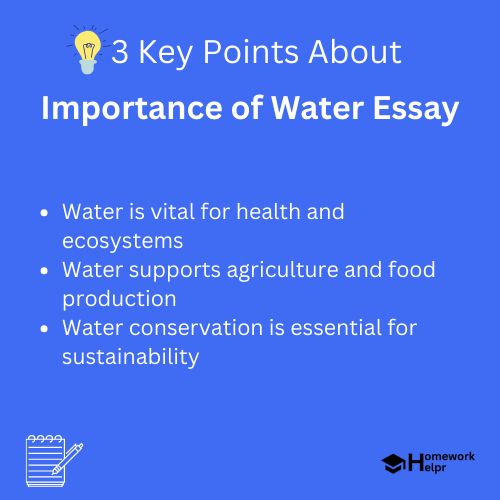📝 Summary
Water is the essence of life and a vital resource for all living beings. Its significance goes beyond daily hydration; water plays a crucial role in our ecosystem, impacting our health, agriculture, and climate. As a chemical substance with various states, water supports biochemical processes, regulates the climate, and provides habitats for aquatic organisms. It is essential for human health, aiding digestion and preventing dehydration. With rising concerns about water scarcity and pollution, practicing water conservation becomes imperative to ensure that future generations have access to clean water.
Importance of Water Essay for Students and Children
Water is the essence of life. It is a vital resource for all living beings, and its significance extends beyond just being a part of our daily hydration. This essay dives deep into the importance of water, its role in our ecosystem, and the impact it has on our health and well-being.
The Basics of Water
Water is a chemical substance with the formula
Definition
Biochemical: Relating to the chemistry of living organisms and the biological processes that they undergo.
Examples
An example of a biochemical process is photosynthesis, where plants use water, sunlight, and carbon dioxide to produce glucose and oxygen.
Water and the Ecosystem
Water plays a crucial role in the Earth‚’ ecosystem. It provides a habitat for numerous aquatic organisms, such as fish, frogs, and plants. Water bodies also regulate the climate through processes like evaporation and precipitation. Furthermore, water is involved in nutrient cycles, which nourishes the soil and promotes plant growth.
Definition
Climate: The long-term pattern of weather in a particular area, influencing its environment and the organisms that inhabit it.
Examples
Wetlands and rivers serve as crucial environments for biodiversity, supporting a wide variety of species while helping to stabilize the ecosystem.

Water and Human Health
For humans, water is just as vital. It aids in digestion, absorption of nutrients, and elimination of waste. The human body needs an adequate amount of water to function correctly, and dehydration can lead to serious health issues like kidney stones and urinary tract infections.
Definition
Dehydration: A condition resulting from excessive loss of water from the body, which can cause bodily functions to fail.
Examples
Drinking plenty of water can help prevent headaches and maintain energy levels throughout the day. The general recommendation is to drink at least 8 glasses of water daily.
The Role of Water in Agriculture
Agriculture heavily relies on water for the irrigation of crops. Without sufficient water, food production could diminish, leading to food scarcity and instability in supply chains. It is crucial for farmers to find sustainable ways to use water efficiently to grow their crops without exhausting this precious resource.
- Drip irrigation systems conserve water by directing it right at the roots of plants.
- Rainwater harvesting collects and stores rainwater for agricultural use.
- Hydroponics is a method where plants grow in water rich with nutrients, reducing the need for soil and large amounts of water.
❓Did You Know?
Did you know that about 70% of the Earth’s freshwater is used for agriculture? This shows how tremendously important it is to manage this resource wisely!
Water Conservation: A Global Responsibility
Given the increasing concerns about water scarcity, it is essential to practice water conservation. This involves using water wisely and reducing wastage. Small actions like turning off the tap while brushing teeth or fixing leaks can significantly save water. More importantly, educating communities and promoting awareness about water conservation can lead to substantial changes in behavior.
Definition
Conservation: The act of preserving, protecting, or restoring the natural environment and its resources.
Examples
Simple actions, like collecting rainwater for gardening or using a broom instead of a hose to clean driveways, can contribute greatly to water conservation efforts.
The Impact of Pollution on Water
Water pollution is a major problem that affects water quality worldwide. Contaminants from industrial waste, agricultural runoff, and sewage enter rivers, lakes, and oceans, making water unsafe to drink and detrimental to aquatic life. Reducing pollution levels is crucial for ensuring that water remains clean and usable for future generations.
- Regular testing of water bodies for pollutants can help monitor water quality.
- Implementing stricter regulations on waste disposal can lead to cleaner water sources.
- Public awareness campaigns regarding the effects of pollution can encourage safer disposal practices.
The Future of Water
As the global population increases and climate change continues to strain water resources, the future of water is challenging. Innovations in technology and sustainable practices, such as desalination and water recycling, are essential for meeting the growing demand for clean water. It is up to each of us to become stewards of our water resources to protect them for future generations.
Definition
Desalination: The process of removing salt from seawater to produce fresh water suitable for human consumption and irrigation.
Examples
Countries like Israel utilize desalination technology to convert seawater into drinking water, ensuring water security despite their arid climate.
Conclusion
In conclusion, water is an indispensable part of our lives. From supporting ecosystems to maintaining human health and fueling agriculture, its importance cannot be overstated. As stewards of this vital resource, it is our responsibility to conserve water and combat pollution. Understanding the role of water in nature and society will help us appreciate it more and inspire us to take action for a sustainable future.
Related Questions on Importance of Water Essay for Students and Children
What is the role of water in ecosystems?
Answer: Water provides habitats and regulates climate.
How does water affect human health?
Answer: It aids digestion and prevents dehydration.
What are some methods for conserving water?
Answer: Drip irrigation and rainwater harvesting are effective.
Why is water pollution a concern?
Answer: It degrades water quality and harms aquatic life.
